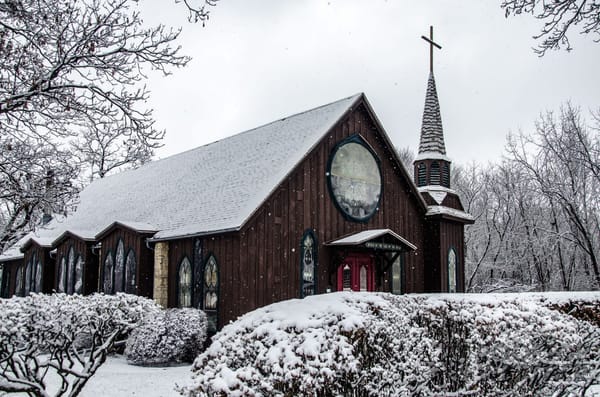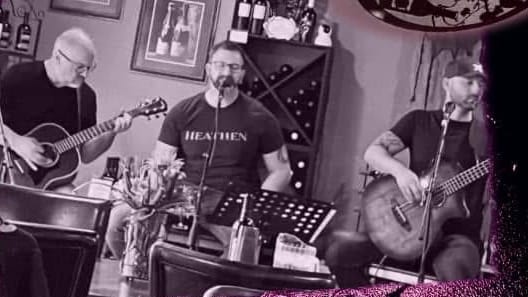Poison Ivy Pub in Roscoe is being sued over music licensing fees
The owner of the Roscoe bar and grill sees a lack of transparency and unfair practices toward bars and restaurants.

Steve Quies, the owner of Poison Ivy Pub in Roscoe, says he's being unfairly persecuted over music licensing fees. The American Society of Composers, Authors, and Publishers (ASCAP) says he's stealing from musicians. The performing rights organization is taking legal action against 13 bars and restaurants nationwide.
Poison Ivy Pub is among those venues.
When I contacted Steve Quies for comment, he invited me to Poison Ivy to talk because he "had plenty to say about it." He sees a lack of transparency and unfair practices by licensing companies toward bars and restaurants.
Once I sat down with the bar owner of 23 years, he revealed his unwavering determination to challenge the prevailing norms of music licensing fees in court. He spoke of his previous legal victory against another performing rights organization (PRO), accused big licensing agencies of unfair practices, and hoped to inspire more small business owners to take a stand.
Quies explained, "I have a jukebox here that Prairie State Gaming owns. Prairie State Gaming collects the revenues and pays me a percentage. They are licensed and established from Atlantic City and Las Vegas."
He voiced his concerns over multiple agencies harassing venues about licensing fees, stating, "It's kind of like, where does it start and where does it end?"
I asked Quies if the American Society of Composers and Publishers (ASCAP) was the only organization taking legal action against bars, restaurants, and other small businesses. He replied, "This isn't the only one. There are multiple agencies that call and continuously harass venues."
When it comes to live performances at his business, Quies believes that performers should be responsible for obtaining licenses because they profit from their performances. "We have one-man bands who come in and play for three hours during dinner service, maybe two times a month. These singers who perform at bars and restaurants know they need to take care of their licenses. They do it for a living, and I pay them for their services. So, they should be the ones providing the license."
He has asked for transparency from licensing agencies about the distribution of collected funds. He says, "I've had numerous conversations with these companies. I have asked them to provide me with all the lists of artists they represent and how this money is dispersed. If I have to pay into a corporation, I have every right to know where these funds are going."
He recounted a past legal battle with another performing rights organization, BMI. He shared, "They'd collect my money but refuse to tell me where it goes. I've been doing this for 23 years. The last time this happened was 9 or 10 years ago. We went to court with BMI, and after three hearings, the judge ruled in my favor." BMI even had to pay Quies a small nominal fee for going back and forth to court for three months. He plans to retake the same action with ASCAP.
Quies has the second oldest liquor license in Roscoe, twenty-four years. He questioned the selective enforcement of music licensing fees, pointing out that larger corporations like grocery stores and doctor's offices are not targeted or subject to the same scrutiny. "Why are they not going after the big corporations? Because it's a scam," he stated.
ASCAP is a performing rights organization (PRO) that ensures that songwriters, composers, and publishers get paid when businesses play their music. PROs sell licenses to businesses playing music and manage the rights and licensing of music professionals while also paying out royalties. They estimate that bars and restaurants pay ASCAP an average of $2 per day for the right to play an unlimited amount of music. Playing music without a license can lead to hefty fines. Many composers sign with different PROs, so business owners may have to buy more than one license to play various music legally.
Quies disputed ASCAP's claim that music licensing costs for bars and restaurants are minimal. "They want to collect thousands of dollars a year from me. But they won't tell me where it goes. Which artists are getting the money? It goes in their pockets, and I want to prove that with a judge," he said. And Prairie State Gaming has already licensed his jukebox, as he pointed out.
He suggested that the agencies might be trying to charge both the venue and the performers, a tactic he described as "double dipping."
Quies recollected the government's mandate to close businesses during COVID and how it hurt the industry. Quies describes the current situation as another attack on small businesses. "They've completely destroyed this industry with COVID. Now, they're just trying to get more money," he said, adding that most small business owners comply out of necessity, but he refuses to pay without transparency.
When I asked Quies if he would obtain licensing if ASCAP provided the requested information, he remained firm, stating, "I don't have to pay because I don't do anything but that jukebox over there. I assume the live performers obtain their licensing. With all the technology today, the music streaming services, and all the different ways people can play music off their phones- what's happened here is these companies have lost their grip. They're just mad at the world because they have no way to protect it."
Quies assured he would publicize the outcome of the legal battle. He encouraged other small businesses to take a stand against what he views as corporate bullying. He said, "I'm going to post it up loud and clear when we're done and how the judge rules. I hope other venue owners will follow suit and stop this nonsense."
A news release sent to Rockton-Roscoe News from Cathy Nesbit of ASCAP, The American Society of Composers, Authors, and Publishers, claims that it seeks to protect its songwriters' livelihoods with legal action against 13 bars and restaurants for performing musical works without permission. On June 25, 2024 in New York, ASCAP announced that it had "filed 13 separate copyright infringements against bars and restaurants nationwide, arising from the unauthorized public performance of its members' copyrighted musical works."
Editor's note: ASCAP stands for The American Society of Composers, Authors and Publishers; that is, the songwriting industry. They don't pay anything to performers unless they write songs. If a musician records a cover song (one they didn't write) and puts it on Spotify or Apple Music, the streaming service pays the performer between 3/10 of a cent and one cent each time the recording is played. But the performer pays royalties to the songwriter. And as ASCAP President Paul Williams once wrote, "We've only just begun." Besides the obvious, the ASCAP website also offers licenses for Adult Entertainment Business, Bowling Centers, Music in the Workplace, Campgrounds / RV Parks, Church or Ministry, Colleges and Universities, Conventions, Meetings and Tradeshows, Dance Schools, Endurance Events, Festivals and Special Events, Fitness Facilities, Hotels and Motels, Ice Skating Rinks, Indoor Playgrounds, Local Governments and Municipalities, Orchestras, Private Clubs Restaurants, Bars and Nightclubs, Retail Stores, Roller Rinks, Shopping Centers, Website and Mobile Apps, and Wineries.
I reached out to Cathy Nesbit of ASCAP to help shed light on the intricacies of music licensing and what this lawsuit's specifics are. Cathy organized a conference call with ASCAP attorney and spokesperson Jackson Wagener. The following conversation has been edited for length and clarity.
Alycia Dioneda: What does this lawsuit involve specifically? Is the lawsuit regarding jukebox music or just live performances?
Jackson Wagener: The lawsuit involves performances by live musicians playing cover music. An ASCAP license can cover various performances, including live music, DJ, karaoke, and jukebox. The license is tailored to the establishment's needs, charging for the kinds of performances they host.
Alycia Dioneda: Should live performers cover the ASCAP licensing and fees?
Jackson Wagener: It is standard practice to license the venues, not the live performers. The benefit of the performance flows to the establishment owners as it draws customers, leading to increased revenue from food and drink sales. Therefore, the establishment owners are responsible for the license.
Alycia Dioneda: Does a jukebox license cover other performances?
Jackson Wagener: A jukebox license only covers performances made by the jukebox. It does not cover live musicians, DJs, karaoke, or other types of performances. Multiple performing rights organizations exist, and each licenses different repertoires of music.
Alycia Dioneda: Do live performers need to carry licenses?
Jackson Wagener: As a practical matter, ASCAP does not license musicians; it licenses the establishments. This is common practice across the country and in Illinois.
Alycia Dioneda: What is ASCAP's policy on transparency in distributing funds?
Jackson Wagener: ASCAP's licensed works are publicly available through an online database. ASCAP operates as a not-for-profit, distributing 90 cents of every dollar collected as license fees to its members. The precise amounts paid to each songwriter are confidential, but the list of songwriters and works is searchable online.
Alycia Dioneda: What is ASCAP's pricing policy for bigger businesses vs local bars and restaurants?
Jackson Wagener: The average cost of an ASCAP license is about $2 a day. The price varies with the size of the venue. When you think about the value that adds to the bar, it's an enormously valuable license. Paying the songwriters and copyright owners is not only the legal thing to do, it's also the right thing to do.
But for Steve Quies, owner of Poison Ivy Pub in Roscoe, this isn't his first go around with a performing rights organization, and he isn't going down without a fight. He doesn't believe that the musicians signing with these licensing companies are seeing the funds small venues pay into.
Quies says, “I know big artists who have told me they receive no money from these companies. That, in turn, tells me that it's a form of extortion because if it's not, then why won't they provide me with the information?. We were the most attacked industry during COVID-19, and now this is just another way to attack us and try to get more money into their pocket. We're just an easy route for them to get more money- the least resistance, most guys will pay it. I won't pay it until they provide me with the information I feel I'm entitled to. As I said, other artists I've talked to said they don't get any money from these companies.
"Society has come up with all these different formats for playing music and doing stuff - half of it I don't even understand. I'm 62 years old, and it is beyond me. And they're mad about it. You hear them on the news. They're threatening people with this A.I. stuff. They just don't know how to enforce it. So what do they do? They attack a small guy. Let's go after him - a guy already devastated by COVID. Let's go after him. It's big corporations that bully little places. That's exactly what it is.”
We asked attorney Jamie E. Wright, founder and CEO of The Wright Law Firm, to weigh in. Wright is a millennial attorney who works at the intersection of law, business, and entertainment. She observes that Quies's "refusal to pay for ASCAP licensing has stirred up a storm."
Wright explains, "Under U.S. copyright law, any venue that publicly plays music, whether live or recorded, typically needs licenses from performing rights organizations (PROs) like ASCAP. Our pub owner argues that his licensed jukebox from Prairie State Gaming should suffice. However, unless the jukebox’s license specifically covers public performances in his establishment, he might still be on the hook."
And when Quies claims that performers should pay for the licenses, not him? Says Wright, "Here’s where it gets really interesting... This argument shakes up the norm because, traditionally, the venue is responsible for obtaining these licenses, not the performers. This defense doesn’t just push the envelope—it challenges the very foundations of existing law and customary practices. The crux of this legal drama will hinge on the fine print of his agreements and whether his bold interpretation of the law will hold up in court. Truth be told, once a final verdict is in place, this case could set a compelling precedent."
Or, in the words of another hit song by ASCAP president Paul Williams, this could be "You and Me Against the World."





